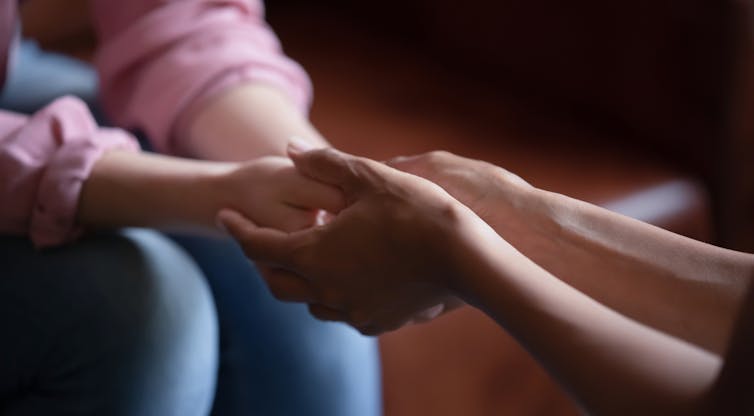
Emily Costello, The Conversation and Thalia Plata, The Conversation
Religious leaders often try to support the people they serve during challenging times. This supportive role was especially important during the past few years as the nation dealt with a pandemic, social distancing and the loss of more than a million lives.
In a recent discussion sponsored by the Global Religion Journalism Initiative, academics and religious leaders discussed faith-based mental health counseling, including its benefits and limitations.
Natasha Mikles, an assistant professor at Texas State University, moderated the discussion.
Academic panelists included Thema Bryant, a trauma psychologist, ordained minister in the African Methodist Episcopal Church and professor at Pepperdine University and Rabbi Seth Winberg, senior chaplain at Brandeis Hillel at Brandeis University. Publisher and author David Morris also took part.
Below are some highlights from the discussion. Answers have been edited for brevity and clarity.
Natasha Mikles: Are there times when religion can actually be a source of stress rather than comfort for someone who’s going through a difficult time?
Thema Bryant: Yes, religion can be used for healing and empowerment, and it also can be used to oppress, marginalize and shame. In psychology, there’s something called positive religious coping and negative religious coping. Positive religious coping is believing that God is loving and ultimately wants to help, and that’s associated with positive mental health outcomes. Fundamentally believing that God is harsh and trying to penalize me is associated with more negative religious outcomes, and more negative mental health outcomes.
Seth Winberg: Yes, depending on the person and the circumstances, the faith, traditions and the community that one is living in, faith can certainly be a burden, or a strain, or a source of trauma. But for many people, faith provides a community, a social network, a sense of shared values, a rhythm to life and a common culture that I think is very powerful.
David Morris: Yes, too often people are given simplistic platitudes about how their loved one is in heaven. But as grief continues, they might be shamed a little bit and be told that they should move on. But grieving takes time. There are plenty of examples in religious literature of people in tremendous grief and tremendous sorrow.
Natasha Mikles: What tools can religious professionals use to help people have a more balanced understanding of how their religious tradition thinks about mental health?
Seth Winberg: In a page of the Talmud, there’s an open dialogue that rabbis across generations and people of faith across generations are having with each other. And I sometimes encourage students to feel free to try to talk to me or with anyone in that kind of open way – to take the risk of asking questions that we might think we can’t ask and still be a person of faith. I think, because of our modern, maybe American, perception of clergy, people don’t expect contemporary faith leaders or rabbis to be open to that kind of discussion. But that’s where Rabbinic Judaism started.
Thema Bryant: Yes, I think there’s a wonderful role for ministers and other faith leaders to play in promoting and creating space for mental health. And one of the pieces is transparency. I have seen ministers from pulpits talk about mental health challenges, talk about their grief, or talk about themselves going to therapy. That can really open the door, letting our humanity show.
Natasha Mikles: In the past two years of the pandemic, have you seen a change in the types of things that young people are struggling with?
Seth Winberg: What I’ve observed personally is a kind of suspended animation of young adults’ social, emotional and spiritual development. I think they’ve really suffered from a lack of in-person interactions in a variety of aspects of their lives, but particularly their social spiritual development. It really does something to be physically distanced from people in such extreme ways.
It’s not so obvious what the right faith-based responses are. One of them is just being present with people and being with them as they try to figure it out – not trying to give them answers and biblical verses, but to just let them express that really uncertain feeling. And having them feel that there’s a slightly older adult in their lives that just nods and lets them express those doubts and those questions, I think, can be helpful.
Thema Bryant: I would definitely agree that a major challenge for young adults has been loneliness and disconnection. Another big piece is around injustice. Some sanctuaries have fought for these issues, but other sanctuaries have not only been silent but have actually promoted really oppressive [ideas]. And I like to say it’s healthy to be outraged about outrageous things. And there are some outrageous things that have been done and said, even in the name of faith and religion. Young people have a need not only for community and companionship, but [support in] addressing social injustices.
Watch the full webinar to hear the panelists discuss the impact of COVID-19 on in person religious traditions, clergy burnout and share more actionable advice for incorporating mental health discussions in faith.![]()
Emily Costello, Managing Editor, The Conversation and Thalia Plata, Editor, The Conversation
This article is republished from The Conversation under a Creative Commons license. Read the original article.